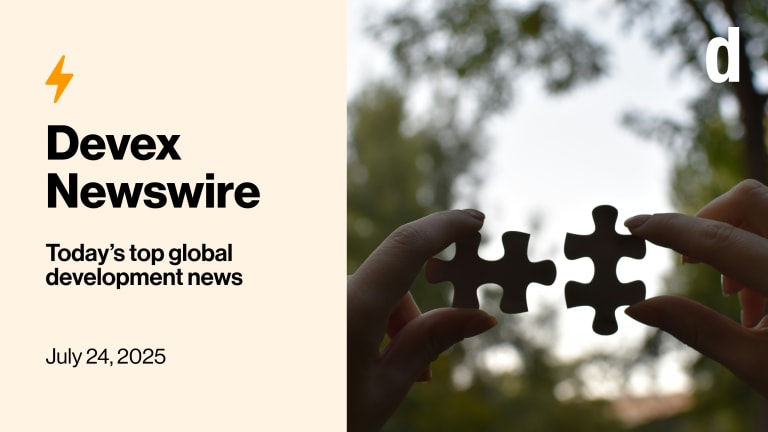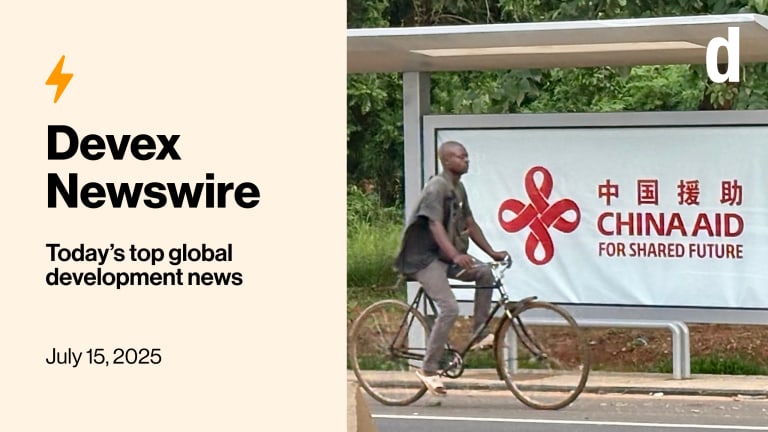
In Vanuatu — an 83-island archipelago in the South Pacific — women are on the forefront of climate change preparedness, response, and resilience. But as our climate continues to worsen, what’s holding these women back from getting funding?
Also in today’s edition: The human toll of hybrid crops, a blood test that could — potentially — screen for cancer, and an MDB “renaissance” (think: less art, more artificial intelligence).
Mark the date: Join us on Monday, May 13, for the latest installment of the Devex Pro Leader Roundtable. This edition brings together leaders to discuss revolutionary ideas that are changing the way philanthropy is done, and how philanthropists are engaging with localization and decolonization. Save your spot now.
Cashless climate crusaders
In the tiny island nation of Vanuatu, an unlikely cadre of women is fighting back against climate change.
This is a preview of Newswire
Sign up to this newsletter for an inside look at the biggest stories in global development, in your inbox daily.
There’s Ellen Tamata, who worked to create an accessible evacuation space for those with disabilities to shelter from disasters. Rita Kaltong, who helps her community raise chickens to sell — and store — in the case of an extreme weather event. And the Women’s Weather Watch, a group of local leaders who warn their neighbors about impending disasters via text.
But according to Devex contributor Rebecca Root, the ability to scale many of these initiatives is sharply limited by a lack of financial backing — something that affects not just women, but local organizations across Vanuatu and the world.
“There is a lot of funding available, but it’s a matter of capacity for smaller organisations and groups to access,” Yasmine Bjornum, the executive director at local feminism-focused NGO Sista, tells Rebecca. “Do they have policies in place? Do they have a finance system? Do they have a board and staff who can handle the human resources, admin, and finance, with a team to implement?”
It has been gauged that only 10% of global climate finance goes to local communities globally, despite calls for localization across the world. Only 0.01% of global climate finance goes toward projects tackling both climate change and women’s rights, Rebecca reports, while Vanuatu itself receives little climate finance — especially when compared to its South Pacific counterparts.
As a result, women like Rita — who is also a mother of four — is one of three women in her village who is trained and charged with ushering her 180-person community into a one-story evacuation shelter, a task she does as a volunteer.
“Our work should be recognized and should be financially supported by governments, whether with our national government or with any donor governments or partners coming in,” says Anne Pakoa, a local women’s rights activist. “If we don't start talking about it, then we will continue to have these financial struggles.”
Dive into the visual story: Women are fighting climate change in the south Pacific, but need money
+ Explore our Roots of Change series where we examine the drive for locally led development to go from rhetoric to reality.
Hybrid crops sprout new problems
Last year, 36-year-old Shalini Sonavane collapsed to the floor of her Indian home. She’d had a sudden fall in blood pressure, and her medical tests showed she was anemic — a condition marked by lower red blood cells and hemoglobin. It didn’t take long for her doctor to diagnose the culprit: free wheat and rice, provided by the Indian government.
To protect crops from recurring climate disasters and improve yields, governments across the world have been pushing farmers to increase the use of genetically modified hybrid crops. These varieties are easy to grow and have a higher yield than native plants — but at the same time, they require an intensive use of chemical fertilizers and pesticides, which can impact not just the soil but the crop’s nutrients.
“With just a month left for childbirth, every day, I fear that my poor hemoglobin can lead to complications during birth and also affect my child," another anemic mother tells Devex contributor Sanket Jain.
With temperatures continuing to rise — and food production continuing to be threatened — governments, Sanket writes, have been forced to seek new alternatives. And with the rising number of climate disasters, experts say that increased anemia is inevitable.
“The trends of food security, increase in drought, extreme weather events are pointing that anemia is going to be a greater problem, and ultimately, it’s going to be women and girls, who are more vulnerable to anemia, who will suffer,” says Phil Evans of the women’s rights organization Karama.
Read: Climate crisis and food insecurity are driving anemia in India
The early bird gets the … cancer
There’s a new type of blood test making waves across Silicon Valley. And though it may sound like we’ve heard this story before, the latest blood test is already showing positive results — confirming stage one cancer in 84% of females and 93% of males, according to its first study.
Today, most cancer screenings are invasive, expensive, and unreliable, from the radiation-exposing CT scan to the anesthesia-required colonoscopy. But by detecting low concentrations of protein in a patient’s blood, those behind this new blood test — Palo Alto-based biotech company Novelna — hope they will soon be able to diagnose early-stage cancers in a more affordable, accessible way.
Though the technology is still under development, Novelna CEO Ashkan Afshin said that if successful, the company hopes to make its blood tests as affordable as pregnancy tests in low- and middle-income countries. But still, Afshin tells Devex Senior Reporter Sara Jerving that further trials are needed to prove the test's efficacy and performance across diverse populations.
“Innovative technologies like ours face significant challenges,” Afshin says.
If Novelna can pull it off — a feat that will require at least two additional trials and several thousands of people — Afshin hopes to bring the blood test to market in about two years. In the meantime, the global health world will be waiting with bated breath, as will most others in the Palo Alto-based blood testing scene (which, apparently, is quite a niche).
Read: Could blood tests make early stage cancer diagnosis accessible?
+ For the latest insider reporting on global health, be sure to sign up to Devex CheckUp, a free, Thursday newsletter – and get today’s edition in your inbox soon.
Just listen
With approximately $40 billion in assets, the Mastercard Foundation has big ambitions. By 2030, it hopes to reach 30 million young people across the African continent, connecting them with “dignified, fulfilling work.”
On the sidelines of the World Bank and International Monetary Fund Spring Meetings, Devex Editor-in-Chief Raj Kumar sat down with the foundation’s CEO, Reeta Roy, to ask her about the journey since 2009, including Roy’s move to Africa.
“We couldn’t do it from Toronto, as we’re a Canadian foundation. We needed to transform ourselves. And that’s what we did,” she told Raj — and now the entire executive team is from Africa, most of the foundation’s staff is from the continent, and 66% of partners that receive funds are African.
On what’s next for the foundation, that “is really what’s now, and that is getting behind young people,” Roy explained. “If you’re building a business, just listen. And if you’re not getting input from young people, go seek it right away.”
Read: Inside the Mastercard Foundation — A conversation with CEO Reeta Roy (Pro)
+ Not yet a Devex Pro member? Access all our exclusive reporting and analyses, data-driven funding insights, invite-only events, and the world’s largest global development job board by starting a 15-day free trial today.
A ‘renaissance’ for MDBs
The Asian Infrastructure Investment Bank is pushing toward the “infrastructure of tomorrow”— a move that the bank’s president, Jin Liqun, hopes will broaden AIIB’s mandate and shift the focus to “smart seaports,” “smart airports,” and even artificial intelligence.
It’s part of an ongoing “renaissance” across the MDB space, Liqun says, one that comes from banks prioritizing collaboration above competition to reach their shared aims.
AIIB is now in talks to provide a second loan guarantee to help out the World Bank — a partnership that would allow the Washington-based entity to expand its lending while strengthening cooperation between the two MDBs, Devex Managing Editor Anna Gawel reports. Liqun also wants to expand the bank’s operations to Central and Eastern Europe, stating countries like Romania “still have a huge gap in terms of infrastructure development.”
But still, collaboration isn’t always easy when your headquarters are in Beijing. AIIB was created by China in 2016, a relationship that to this day raises questions about AIIB’s independence. It’s something Liqun is adamant about hammering home to those across the world.
“I think now, even though people still refer to this bank as the China-led bank, more and more people come to recognize that this is really a multilateral development bank, operating by very high standards — otherwise we could not cooperate with the World Bank, ADB, EBRD,” Liqun tells Anna.
Read: Asian Infrastructure Investment Bank wants to go beyond infrastructure
+ For more content like this, sign up to Devex Invested, a free, weekly newsletter bringing you the insider brief on business, finance, and the SDGs.
In other news
Japan's official development assistance surged to a record $19.6 billion in 2023, as the country ramps up foreign aid amid China’s growing influence in the Indo-Pacific. [Nikkei Asia]
World Food Programme's deputy executive director, Carl Skau, has warned that the escalating Lebanon-Israel conflict could overwhelm the food agency's ability to meet nutritional needs in crisis-hit Lebanon. [The Washington Post]
The International Monetary Fund has reached a staff-level agreement with the Democratic Republic of Congo on a $1.5 billion loan deal’s final review after past issues linked to a lack of transparency in its mining sector. [Reuters]
Sign up to Newswire for an inside look at the biggest stories in global development.
Update, May 9, 2024: This article has been updated to clarify Mastercard Foundation CEO Reeta Roy spoke with Devex’s Raj Kumar.




